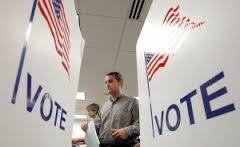Milwaukee election officials demean, intimidate observers, monitors claim

By M.D. Kittle | Wisconsin Reporter
MADISON, Wis. — Republican Party election observers monitoring in-person absentee voting at Milwaukee’s largest polling place say partisan election officials are shutting them out.
Reports to Wisconsin Reporter from observers at the Zeidler Municipal Building in downtown Milwaukee detail the strict enforcement of the Democrat-heavy Milwaukee Election Commission’s edict keeping poll workers as far away from voters as a new state law will allow — eight feet.
“I could neither see what any voters was providing for (proof of residency) nor hear the conversation between the election worker and the voter, who was then given a ballot,” one observer told Wisconsin Reporter.
PUSHED BACK: Republican poll observers say Milwaukee election officials are pushing them back farther, limiting the ability to fairly monitor early voting.
Conservative activist Orville Seymer said he was at the municipal building Thursday. He said there was one chair in the center of the voting area, in the northeast corner of the building, designated for observers. The chair is surrounded by red tape.
“You cannot move the chair. I don’t know what they would do if (two) people wanted to be observers,” Seymer wrote in an email to Wisconsin Reporter. “The only thing missing was the ‘Dunce Cap.’”
Observers, under law and unlike voters, are made to present a photo ID to the chief election inspector.
“Within a few minutes, I was approached by a city election clerk who told me that I had (three) choices, I could vote, I could sign up as an observer or I could leave. I chose to leave,” Seymer said. “Remember, this is a public building.”
He said he would have taken pictures of the scene, but that is against the law. The state Government Accountability Board earlier this year ruled observers may not take photos at the polls.
Wisconsin Act 177, which went into effect in April, allows the chief election inspector or municipal clerk to restrict the viewing area of poll observers to an area “not less than three feet nor more than 8 feet from the table at which electors announce their names and addresses to be issued a voting number a polling place …”
The Milwaukee Election Commission, led by two Democrats and one Republican, appears to be pushing the distance limit as far back as allowed.
The “Election Commission may restrict the location of election observers from between six to eight feet,” City Attorney Grant Langley and two of his assistant wrote in the letter, dated May 1, to Neil Albrecht, executive director of the Milwaukee Election Commission.
“We believe that this would adequately allow observers to fully observe the election process while at the same time maintaining confidential elector information,” Langley wrote.
The election commission’s deputy director did not immediately return a phone call from Wisconsin Reporter seeking comment.
Campaign and election law expert Hans von Spakovsky, a former member of the Federal Election Commission, said the rule is “ridiculous.”
“Any rule that keeps an observer so far away that they are unable to properly observe is not just improper, it’s wrong. It negates the whole purpose of having poll watchers of both parties there, so they can make sure election officials are doing everything according to law,” said Hans von Spakovsky, senior legal fellow in the Heritage Foundation’s Edwin Meese III Center for Legal and Judicial Studies.
Negating the work of poll observers might just be the intention, according to Marguerite Ingold, the long-time Republican election observer in Democrat-dense Milwaukee who has been banned from monitoring next month’s elections in the city. The 78-year-old grandmother’s apparent crime? She raised concerns about campaign and election violations at a Milwaukee nursing home where city-employed special voting deputies were helping residents vote.
Albrecht, in a letter banning Ingold, claimed the volunteer observer was being disruptive, a charge Ingold denies. Albrecht, according to Ingold, told the elderly woman he took the step to block her from the polls because he thought Ingold might have become violent and stormed City Hall.
She said she believes the Milwaukee Election Commission’s harsh and unusual punishment is all about intimidation. Others see the broader distance rule about control.
With Wisconsin’s on-again-off-again voter ID law now off again, thanks to intervention by the U.S. Supreme Court, election integrity advocates feel the role of the observer will be even more critical in next month’s election.
Seymer said there were no Republican observers at the municipal building during the time he was there Thursday.
“I don’t blame them. The entire process is very intimidating and very demeaning,” he said.
“Maybe we can get a few legislators to go down there and see how Milwaukee has corrupted our elections,” he added.







